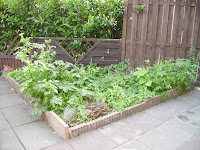Monday, June 30, 2008
Workshop Urban Permaculture has been canceled!
Since there were not enough subscriptions, weekend Urban Permaculture 18,19, 20 july 2008 has been canceled; those who already payed the fee will be reimbursed.
Monday, June 16, 2008
Upgrading my tiny garden
After removing some tiles and the hortensia, my garden looked like a desert...
Watch that corner in the triangle, that's the place to start a small 'cold' compost-heap.

Now, a few months later, my garden is running wild!
Even the potatoes are flowering.
Now I have to figure out how to keep the potatoes in check; having potatoes in my garden for a long time will deplete the ground unless I find some other plants that will remedy this...

Watch that corner in the triangle, that's the place to start a small 'cold' compost-heap.
Now, a few months later, my garden is running wild!
Even the potatoes are flowering.
Now I have to figure out how to keep the potatoes in check; having potatoes in my garden for a long time will deplete the ground unless I find some other plants that will remedy this...
Wednesday, June 11, 2008
The Fukuoka Farming website
Masanobu Fukuoka was a Japanese farmer who developed what many consider to be a revolutionary method of sustainable agriculture. He is also the author of "The One-Straw Revolution" and several other books examining both his philosophy and his method of farming.INFORMATION ON:
This website is an outgrowth and extension of The Fukuoka Farming Mailing List. Both were created as a place where people interested in Fukuoka's method can network and share resources and experiences.
- Identifying and using plants
- Trees, forest gardens, and agroforestry
- Bioremediation
- Using plants to detoxify soils and water
- Edible wild foods
- Foraging, growing, and using wild plants
- Making and using seedballs
Tuesday, June 10, 2008
Mulching
"Cold Outdoor Pile
Pro:
Easy to start. Can add material continuously.
Very low maintenance and the resulting compost is very rich in soil organisms.Contra:
Takes more than a year to decompose. Some nutrients are leached and can also attract animals."
Intrepreting the system mentioned above, I just started piling up 'grown' waste (old straw, tough vegetable stems and hedge clippings) and 'green' waste (fruit, coffee grounds, cut flowers, grass clippings) in small amounts every week.
It looks I have to be very patient... that'll teach me for being a lazy gardener!
Sour Mulch
Beware of Sour Mulch
Oops! There is a brown spot in my garden, just in the corner where I left a large pile of compost for a while...
"..both drought and excess water can cause similar symptoms -- both damage roots, and the plant wilts and turns brown....When organic material used for mulch has been composted improperly, the result can be "sour mulch," which is toxic to lawns, bedding plants, and newly planted shrubs. "
Oops! There is a brown spot in my garden, just in the corner where I left a large pile of compost for a while...
Monday, June 9, 2008
Bokashi Composting
Bokashi (Japanese for "fermented organic matter") is a method of intensive composting.
It can use an aerobic or anaerobic inoculation to produce the compost.
Once a starter culture is made, it can be re-used, like yogurt culture.
Since the popular introduction of effective microorganisms (EM), Bokashi is commonly made with only molasses, water, EM, and wheat bran.
However, Bokashi can be made by inoculating any organic matter with a variety of hosts of beneficial bacteria/microbes.
This includes manures, spent mushroom compost, mushroom spores, worm-casting tea, forest soil tea, yeast, pickles, sake, miso, natto, wine and beer.
Molasses feeds the microbial cultures as they inoculate the organic matter.
Source: http://en.wikipedia.org/wiki/Bokashi
Some more discussion on Bokashi: http://dirtbyamystewart.blogspot.com/2006/02/bokashi.html
Comment: I would like to learn how to make a Bokashi starter-set in a easy way, as in...Bokashi for dummies!
Illustration on youtube:
Subscribe to:
Comments (Atom)